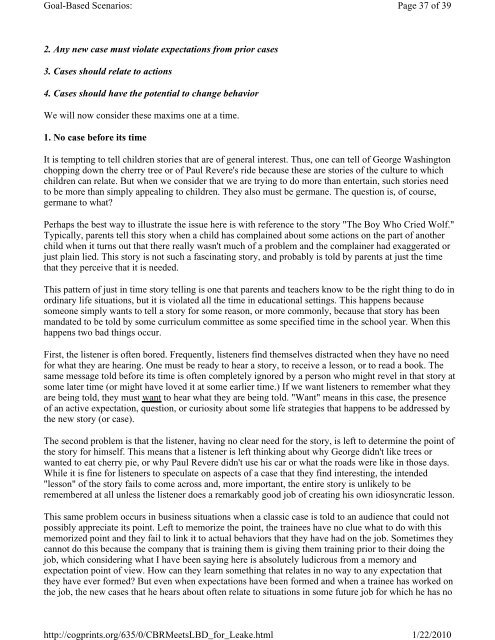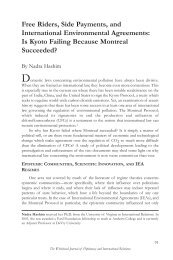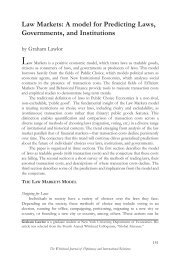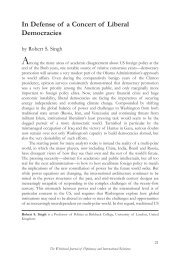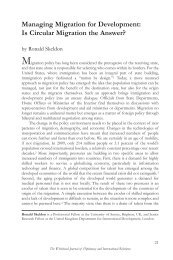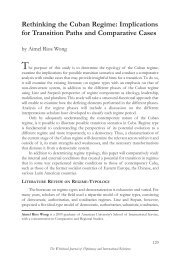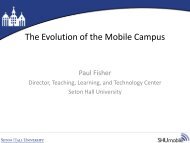Case-Based Reasoning Meets Learning by Doing
Case-Based Reasoning Meets Learning by Doing
Case-Based Reasoning Meets Learning by Doing
You also want an ePaper? Increase the reach of your titles
YUMPU automatically turns print PDFs into web optimized ePapers that Google loves.
Goal-<strong>Based</strong> Scenarios:<br />
2. Any new case must violate expectations from prior cases<br />
3. <strong>Case</strong>s should relate to actions<br />
4. <strong>Case</strong>s should have the potential to change behavior<br />
We will now consider these maxims one at a time.<br />
1. No case before its time<br />
Page 37 of 39<br />
It is tempting to tell children stories that are of general interest. Thus, one can tell of George Washington<br />
chopping down the cherry tree or of Paul Revere's ride because these are stories of the culture to which<br />
children can relate. But when we consider that we are trying to do more than entertain, such stories need<br />
to be more than simply appealing to children. They also must be germane. The question is, of course,<br />
germane to what?<br />
Perhaps the best way to illustrate the issue here is with reference to the story "The Boy Who Cried Wolf."<br />
Typically, parents tell this story when a child has complained about some actions on the part of another<br />
child when it turns out that there really wasn't much of a problem and the complainer had exaggerated or<br />
just plain lied. This story is not such a fascinating story, and probably is told <strong>by</strong> parents at just the time<br />
that they perceive that it is needed.<br />
This pattern of just in time story telling is one that parents and teachers know to be the right thing to do in<br />
ordinary life situations, but it is violated all the time in educational settings. This happens because<br />
someone simply wants to tell a story for some reason, or more commonly, because that story has been<br />
mandated to be told <strong>by</strong> some curriculum committee as some specified time in the school year. When this<br />
happens two bad things occur.<br />
First, the listener is often bored. Frequently, listeners find themselves distracted when they have no need<br />
for what they are hearing. One must be ready to hear a story, to receive a lesson, or to read a book. The<br />
same message told before its time is often completely ignored <strong>by</strong> a person who might revel in that story at<br />
some later time (or might have loved it at some earlier time.) If we want listeners to remember what they<br />
are being told, they must want to hear what they are being told. "Want" means in this case, the presence<br />
of an active expectation, question, or curiosity about some life strategies that happens to be addressed <strong>by</strong><br />
the new story (or case).<br />
The second problem is that the listener, having no clear need for the story, is left to determine the point of<br />
the story for himself. This means that a listener is left thinking about why George didn't like trees or<br />
wanted to eat cherry pie, or why Paul Revere didn't use his car or what the roads were like in those days.<br />
While it is fine for listeners to speculate on aspects of a case that they find interesting, the intended<br />
"lesson" of the story fails to come across and, more important, the entire story is unlikely to be<br />
remembered at all unless the listener does a remarkably good job of creating his own idiosyncratic lesson.<br />
This same problem occurs in business situations when a classic case is told to an audience that could not<br />
possibly appreciate its point. Left to memorize the point, the trainees have no clue what to do with this<br />
memorized point and they fail to link it to actual behaviors that they have had on the job. Sometimes they<br />
cannot do this because the company that is training them is giving them training prior to their doing the<br />
job, which considering what I have been saying here is absolutely ludicrous from a memory and<br />
expectation point of view. How can they learn something that relates in no way to any expectation that<br />
they have ever formed? But even when expectations have been formed and when a trainee has worked on<br />
the job, the new cases that he hears about often relate to situations in some future job for which he has no<br />
http://cogprints.org/635/0/CBR<strong>Meets</strong>LBD_for_Leake.html<br />
1/22/2010


